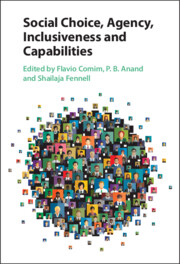Book contents
- Social Choice, Agency, Inclusiveness and Capabilities
- Social Choice, Agency, Inclusiveness and Capabilities
- Copyright page
- Contents
- Figures
- Tables
- Contributors
- Preface and Acknowledgements
- 1 Introduction: social choice, agency, inclusiveness and capabilities
- Part I Social Choice and Capabilities
- 2 The many facets of social choice theory
- 3 Beyond capabilities?
- 4 Examining the challenge of communication in diffusing innovative education programmes
- 5 Nudging the capabilities for a sustainable city?
- 6 Social choice and research capacity strengthening in Nigeria
- Part II Inclusiveness, Social and Individual Agency
- Part III Social Choice and Capabilities in Action
- Index
- References
4 - Examining the challenge of communication in diffusing innovative education programmes
An analysis drawing on public choice, social choice and capability framings
from Part I - Social Choice and Capabilities
Published online by Cambridge University Press: 28 March 2024
- Social Choice, Agency, Inclusiveness and Capabilities
- Social Choice, Agency, Inclusiveness and Capabilities
- Copyright page
- Contents
- Figures
- Tables
- Contributors
- Preface and Acknowledgements
- 1 Introduction: social choice, agency, inclusiveness and capabilities
- Part I Social Choice and Capabilities
- 2 The many facets of social choice theory
- 3 Beyond capabilities?
- 4 Examining the challenge of communication in diffusing innovative education programmes
- 5 Nudging the capabilities for a sustainable city?
- 6 Social choice and research capacity strengthening in Nigeria
- Part II Inclusiveness, Social and Individual Agency
- Part III Social Choice and Capabilities in Action
- Index
- References
Summary
This chapter addresses the questions of how policy choices to improve education might be addressed by looking across social choice theory, public choice theory and capability approaches. The intention is to try and understand how to evaluate innovative programmes that are set up to improve the chances of the most disadvantaged children, and why these well-intentioned programmes continue to face challenges in terms of ensuring a scaling-up procedure. The chapter draws on an evaluative study undertaken in 2014 and 2015 to examine the dissemination and scaling up of the educationally innovative Activity Based Learning (ABL) programme in Tamil Nadu, India, to improve the retention rates and learning outcomes of children from challenging socio-economic backgrounds. The studys aim was to compare the manner and rolling out of the programme in Tamil Nadu with ABL programmes elsewhere, and to ascertain the extent to which they had been successful.
- Type
- Chapter
- Information
- Social Choice, Agency, Inclusiveness and Capabilities , pp. 62 - 84Publisher: Cambridge University PressPrint publication year: 2024



